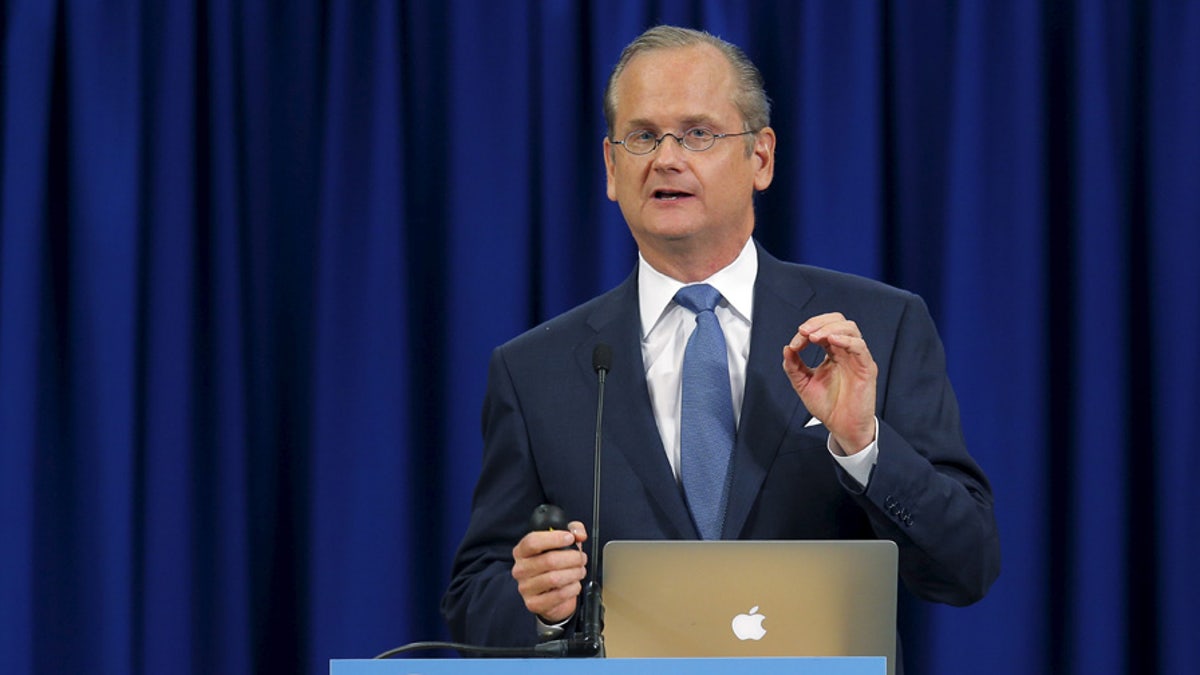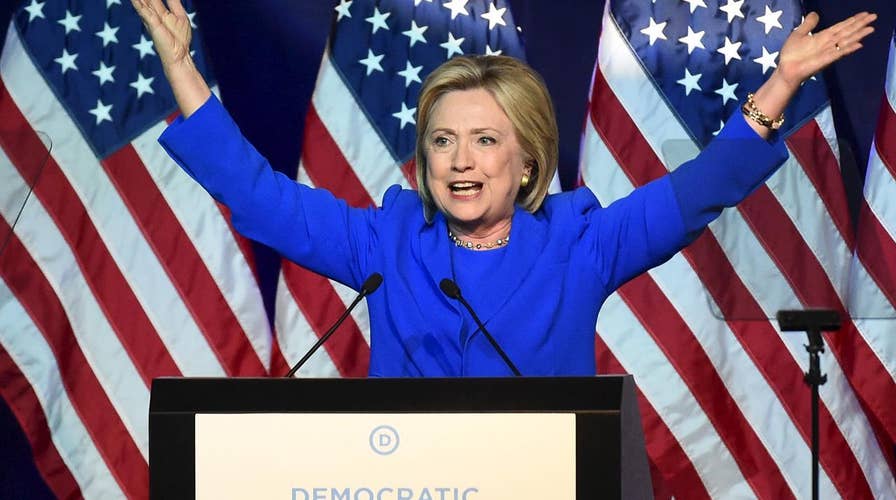Is Hillary Clinton considering another run in 2020?
Fox News contributor Guy Benson on tax reform, former FBI Director James Comey and Hillary Clinton's political future.
A liberal-led push to overhaul the Electoral College could be moving from the op-ed pages to the courtroom, as a Harvard professor who flirted with a dark-horse Democratic presidential bid last year vows litigation to change the system.
Criticism of the Electoral College was resurgent in the wake of Hillary Clinton’s 2016 loss. Clinton recently said she wants the system "eliminated." The latest effort isn’t aimed at dismantling the structure entirely – but rather, the winner-take-all system used by 48 states in awarding electors, which ends up focusing presidential races on a handful of battlegrounds.
“With a winner-take-all, most of America is ignored,” professor Lawrence Lessig said in previewing his legal case – which, like any challenge to the Electoral College, faces a steep uphill climb.
Lessig, though, argues the system violates the 14th Amendment’s one-man-one-vote principle. Currently, all but two states award all electors to the winner of the state’s popular vote. Lessig said 24 people have volunteered to be plaintiffs, though he’s still deciding which states to focus on.
“We are looking for a Republican from a blue state whose vote never counts and a Democrat from a red state whose vote never counts,” he said.
Lessig, who was very briefly a Democratic candidate for president for the 2016 cycle, insists this isn’t a partisan endeavor and will consist of at least two separate lawsuits. If he were to beat the odds and prevail, the kind of overhaul he seeks could have mixed results -- theoretically allowing Democrats to pick up electoral votes in deep-red territory and Republicans to win electors in deep-blue states like California and New York.

Lawrence Lessig, shown in New Hampshire during his stint as a Democratic presidential candidate in September 2015, wants to overhaul the Electoral College. (Reuters)
While it would require a constitutional amendment to ditch the Electoral College for a national popular vote system, the Constitution does not mandate how states award electors. Maine and Nebraska actually divvy up electors by congressional district. Donald Trump picked up one Maine elector in 2016 and Barack Obama won a Nebraska elector in 2012.
Another alternative—which Lessig prefers—would be a proportional system, where a losing candidate could still get a percentage of the state’s electors based on the popular vote.
Lessig contends other proposals, such as the National Popular Vote Interstate Compact, could take decades to fully implement. By contrast, a court ruling could force states to move to a proportional system by 2020.
Lessig, meanwhile, warns that election results that defy the popular vote could become more common.
“Two of the last three presidents were inaugurated without winning the popular vote,” he noted, referring to Trump’s victory in 2016 and George W. Bush’s in 2000. It has happened in just three prior elections: 1888, 1876 and 1824. “The number of times the Electoral College doesn’t conform with the popular vote will go up given the demographics,” Lessig predicted.
'The Supreme Court could knock this out.'
The current system undoubtedly concentrates campaign spending. Just 14 battleground states saw 99 percent of ad spending and 95 percent of candidate visits for campaign purposes in 2016, according to Equal Citizens.
David Boies, who was the lead counsel for former Vice President Al Gore in the Bush v. Gore Supreme Court case in 2000, and Richard Painter, the chief White House ethics attorney under President George W. Bush, are part of the legal team for the case.
But the system has its defenders.
Gary Rose, chairman of the political science department at Sacred Heart University and author of “Haywire: A Chronology of the 2016 Presidential Contest,” said it provides stability.
“Under a district plan, we could see a number of third-party candidates emerge, competing for a narrow portion of the vote by just running in congressional districts,” Rose told Fox News. “A proportional system would be a recipe for France, a multi-party system, with a plethora of small parties that are hardly bigger than an interest group.”
Interestingly, fear of third parties brought Congress to its closest point of scrapping the Electoral College. After third-party candidate George Wallace won 46 electoral votes in 1968, the House of Representatives voted 338-70 in 1969 to abolish the Electoral College and require the winner to a presidential election to carry at least 40 percent of the vote. The proposed constitutional amendment was blocked by a Senate filibuster.
While candidates visit only a handful of swing states now, Rose said, under a national popular vote system, presidential candidates would ignore smaller states.
“A national popular vote would be a detriment to the American people, and many voters would really feel disenfranchised if the campaign moved only to the urban areas,” Rose said.
Proving standing for the litigation could pose a challenge depending on which court hears the cases, added Roger Austin, an election lawyer and former general counsel for the Florida Republican Party who also questions the case’s legal merits.
“The Supreme Court could knock this out as a political question that they do not want to tackle or leave to the political branches,” Austin told Fox News. “The court has ducked a lot of cases this way.”
Trump won 306 electoral votes in 2016 to Clinton’s 232, though Clinton won a plurality of the popular vote, with 48.5 percent to Trump’s 46.4 percent. The irony might be that Trump could still have triumphed under a reformed system.
Under a district plan, Trump would have won 290 electoral votes, according to an analysis by the website 270toWin.com. The analysis found under a proportional system, Trump would have won 267 votes to Clinton’s 265. A third party would have gained six electoral votes, sending the matter to the House of Representatives.
But Lessig’s own analysis of a proportional system found Clinton winning the needed 270 to Trump’s 267.
While technically looking ahead to future elections, Lessig hasn’t quite given up on the last one. He recently penned a Medium post imagining a scenario where Trump is impeached, eventually leading to House Speaker Paul Ryan becoming president – and then handing the presidency to Hillary Clinton.
“I realize this all sounds crazy right now,” he wrote.





